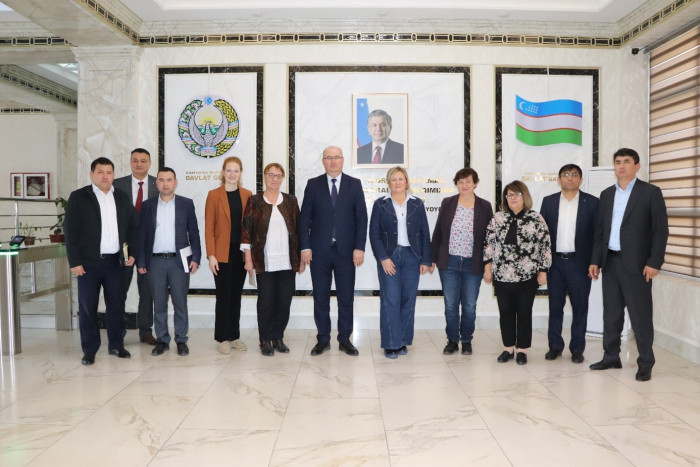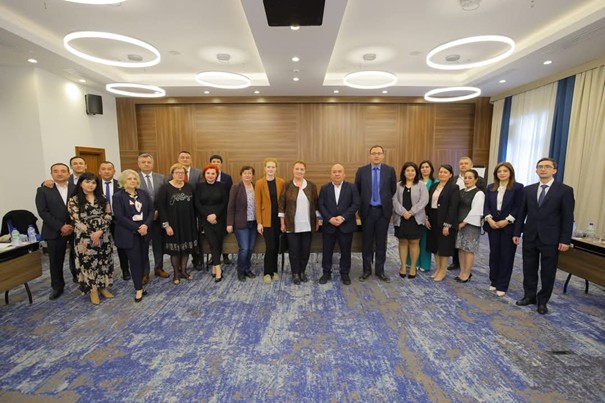
We are pleased to announce the successful completion of the project "Development of Animal Husbandry and Plant Health in Uzbekistan and strengthening of the veterinary and animal husbandry committee and the plant quarantine and protection agency," implemented by GOPA AFC GmbH and funded by the German Government via Deutsche Gesellschaft für Internationale Zusammenarbeit (GIZ) GmbH. This comprehensive initiative, spanning from November 2022 to April 2025, has significantly strengthened the capacities of the Veterinary and Animal Husbandry Committee and the Plant Quarantine and Protection Agency (PQPA) in Uzbekistan.
Key achievements of the project include:
- Strengthening Scientific Research Institutes: The project provided extensive training and consulting to enhance the capabilities of research institutes involved in veterinary and plant health. Notable efforts include the analysis of the Research Institute of Plant Quarantine and Protection (RIPPQ)
- Capacity Building: The PQPA benefited with many strategic documents which were produced: Recommendations on needs for capacity building of the PQPA, recommendations on needs for capacity building of national plant protection organisation of the Republic of Uzbekistan in the area of PPPs and fertilizer assessment and authorisation, recommendations for development of IT system for plant protection products and fertilizer registration process management (assessment and authorisation), recommendations for development of IT system for improving and upgrading of the existing public list of registered fertilizers and PPPs on beneficiary website as a part of E-Phyto system, Recommendations for upgrading re-registration process and labelling of Plant Protection Products, recommendations for informatization of business processes in the area of Plant Protection Products and fertilizers. Documents included the introduction of new norms and standards in plant protection and safe practices focusing on sustainable use of pesticides. Along with strategic documents, three guidelines were produced: Guidelines on harmonization and comprehensive toxicological assessment, Guidelines on harmonized and comprehensive ecotoxicological assessment and Guidelines for basic part of the sustainable use of pesticides in the area of distribution, professional and non-professional use.
- International Collaboration and Knowledge Exchange: The project facilitated international conferences and study trips, fostering scientific exchange and collaboration. Highlights include participation in the International Conference “Modern Approaches in the study of the plant kingdom” in Azerbaijan and EUroTier in Hannover, a study tour to Croatia where among others the Institute for agriculture and tourism in Poreč signed a Memorandum of Understanding with the PQPA, a study trip of the Uzbek delegation from the PQPA (to the Republic of Serbia (Zlatibor) was organised in the form of participation in the IX Congress for Plant Protection; as well as a “Train the Trainers programme on herd management and animal health for cattle” took place in Germany hosted by our project partner Hochschule Weihenstephan Triesdorf. Furthermore, with the singed Memorandums of Understanding between the PQPA of the Republic of Uzbekistan and the Plant Protection Society of the Republic of Serbia and Memorandum of Understanding between the Uzbek PQPA and the Croatian Society of Plant Protection international cooperation is strengthened and future development of joint projects agreed.
- Public-Private Dialogues (PPDs): The project supported the organization of multiple PPDs, enhancing cooperation between public and private sectors. This included developing roadmaps, establishing working groups, preparing standard operating procedures, strategic documents and action plans.
- Laboratory Capacity Enhancement: Efforts were made to strengthen laboratory infrastructure and services, including workshops on NORM ISO 17025 and Good Laboratory Practice (GLP) with emphasis on plant pest diagnostics. Several new standard operating procedures (SOPs) have been prepared and are already being applied, with an emphasis on the fields of bacteriology, virology, and mycology. The analysis of the Central Phytosanitary Laboratory (CPL) of PQPA and the laboratories at the Research Institute of Plant Quarantine and Protection (RIPPQ) is presented in the document Recommendations on needs for capacity building of relevant laboratories (CPL PQPA and RIPPQ) of the Republic of Uzbekistan. Analysis of the laboratory situation at Republican Centre for Agrochemical Analysis (RCAA) was presented in the document. The analysis of relevant laboratories and accreditation potential for important national and international analyses at Republican Centre for Agrochemical Analysis (RCAA). A fee system for common and necessary laboratory analyzes in CPL and RIPPQ was developed, as well as a catalog of laboratory equipment and materials for CPL of PQPA.

This project has laid a robust foundation for sustainable agricultural practices and improved plant and animal health in Uzbekistan, aligning with international standards and contributing to the global Green Deal objectives. We extend our gratitude to all participants, experts, and stakeholders for their dedication and collaboration throughout this endeavor.
For further information, please contact Nina Kristin Thurn (NinaKristin.Thurn [at] gopa.eu.
